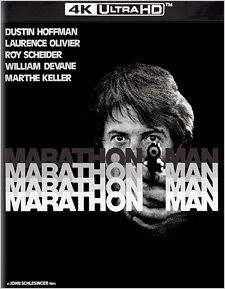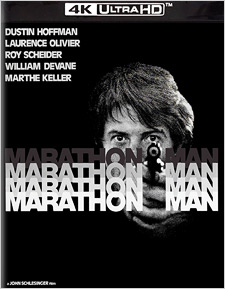Marathon Man (4K UHD Review)

Director
John SchlesingerRelease Date(s)
1976 (February 28, 2023)Studio(s)
Paramount Pictures (Kino Lorber Studio Classics)- Film/Program Grade: A
- Video Grade: B+
- Audio Grade: B
- Extras Grade: A-
Review
Marathon Man has always had its feet comfortably resting within multiple genres since its release in 1976, including psychological thriller, horror, and espionage. In truth, it’s a combination of the three, a combination of which that was, and still is, thoroughly effective. Readers of this site will undoubtedly be filling up the social media comments sections with the phrase “Is it Safe?” once it goes live, which even to those who’ve never ever seen the film, have absorbed that quote through popular culture. Director John Schlesinger’s adaptation of William Goldman’s novel (Goldman adapted the screenplay with final screenwriting duties purportedly performed by an uncredited Robert Towne) was a success upon release, further cementing both Dustin Hoffman and Laurence Olivier as actors to be reckoned with. So much so that Olivier was nominated for an Oscar for his role as the murderous Nazi war criminal turned diamond thief.
Babe (Hoffman) is a marathon runner by hobby in New York City, but spends his time as a college student researching history, particularly the death of his father during the McCarthy era, which he’s obsessed with. His brother Doc (Roy Scheider), an undercover government agent posing as a successful businessman, pays him a sudden visit. Doc is aware that he’s being followed by criminals attempting to smuggle diamonds out of the country, needing the assurance that their actions will be secure. Meanwhile, Babe begins a relationship with the beautiful Elsa (Marthe Keller), which is cut short when Dr. Christian Szell (Olivier) and double agent Peter Janeway (William Devane) kidnap and torture Babe in order to find out what Doc may have told him. After an infamous and torturous dental session, Babe escapes and is on the run, not sure who to trust and always looking over his shoulder, but determined to survive.
Marathon Man was certainly a blessed film, not just because of its astonishing acting talent, but also because of those who wrote and produced it. By this point, Dustin Hoffman was already an established star, but Laurence Olivier, who had fallen on hard times due to multiple illnesses, had a rebirth of sorts. It was also a production in which everybody got along well, and according to Hoffman, was a pleasure to work on because of his relationships with Schlesinger and Olivier. One could go into more detail about the film, but discussing its plot further (despite its status as a pop culture fixture) would be doing it a disservice. It’s one of those films that has one very renowned element, but is overlooked when it comes to the rest of its content. In essence, Marathon Man is an excellent thriller with a cast and crew firing on all cylinders that continues to stand up and be just as effective as it was when it was originally released.
Marathon Man was shot by cinematographer Conrad Hall on 35 mm film using Panavision Panaflex and Arriflex cameras with Panavision lenses, finished photochemically, and presented in the aspect ratio of 1.85:1. Kino Lorber brings the film to Ultra HD with a new 4K restoration of the original camera negative and grading performed by Paramount Pictures for High Dynamic Range (HDR10 and Dolby Vision options are available). It’s a major upgrade over previous releases, though with a few caveats. It’s a very organic presentation, with healthy grain levels and a bitrate that sits primarily between 70 to 90Mbps, dipping below that occasionally. As such, it’s natural to its source, but it does have a few variances in terms of resolution and color temperature. The HDR grades get the most detail out of the palette when it’s stable, but there instances when there’s a blueish, green tint to the scenes, most notably during Babe’s country house showdown. There are also a couple of moments where lower resolution elements appear to have been used, possibly to cover damage to the original negative, as the quality dips significantly. Blacks are also a bit crushed at times, but overall contrast is acceptable. The image is stable and there’s little to no damage leftover other than minor speckling, making it a mostly solid presentation, but could have used slightly more attention during the encoding and grading processes.
Audio is included in English 5.1 and 2.0 DTS-HD Master Audio with optional subtitles in English SDH. The stereo track seems like a fold-down of the 5.1, meaning that the original mono soundtrack has not been included. The 5.1 doesn’t do much to really broaden the original sound design. Dialogue is discernible and score and sound effects are given plenty of attention, but this is not necessarily a film that needs a surround experience as it’s more intimate than bombastic. The original mono track would have been preferable, but as is, these two tracks are merely decent.
Marathon Man on 4K Ultra HD sits in a black amaray case alongside a 1080p Blu-ray containing the same transfer, with an insert and slipcover featuring the original theatrical artwork. The following extras are included on each disc:
DISC ONE (UHD)
- Audio Commentary with Nathaniel Thompson and Steve Mitchell
DISC TWO (BD)
- Audio Commentary with Nathaniel Thompson and Steve Mitchell
- The Magic of Hollywood... Is the Magic of People (SD – 21:14)
- Going the Distance: Remembering Marathon Man (SD – 29:07)
- Rehearsal Footage (SD – 21:06)
- TV Spots (HD – 10 in all – 5:53)
- Radio Spots (HD – 2 in all – 1:05)
- Trailer (HD – 2:39)
- The Eiger Sanction Trailer (SD – 2:49)
- The Groundstar Conspiracy Trailer (SD – 2:37)
- Winter Kills Trailer (SD – 3:20)
- The Intercine Project Trailer (SD – 3:00)
- Rosebud Trailer (HD – 2:41)
- Sudden Terror Trailer (SD – 3:11)
- Billy Bathgate Trailer (SD – 1:45)
- Billy Liar Trailer (SD – 4:16)
- Honky Tonk Freeway Trailer (SD – 2:40)
- The Falcon and the Snowman Trailer (SD – 2:04)
New to this release is an audio commentary with author and film historian Nathaniel Thompson and documentarian Steve Mitchell, which is included on both discs. Mitchell, a native New Yorker, offers his thoughts on aspects of the city from the era, how it’s presented in the final film, and how he was present during some of the filming. He also highlights various locations used in the film. He and Thompson cross paths when talking about the cast and crew, as well as the source material. It’s a very fine, informative track that manages to cover plenty of ground that the other supplements do not. The rest of the extras are included on the Blu-ray only. The Magic of Hollywood offers a set of vintage on-set interviews with producer Robert Evans, Dustin Hoffman, and Marthe Keller, as well as behind-the-scenes and wrap party footage. Going the Distance is an excellent 2001 documentary on the film, featuring interviews with Robert Evans, screenwriter William Goldman, Roy Scheider, Dustin Hoffman, and Marthe Keller. The Rehearsal Footage features interviews with producer Robert Evans, Roy Scheider, and Marthe Keller, which are interspersed between several pieces of footage of the two actors—including Dustin Hoffman—rehearsing various scenes. The rest of the extras consist of 10 TV spots, 2 radio spots, the trailer, and trailers for other films available through Kino Lorber.
Thought the visual and aural qualities of this UHD upgrade of Marathon Man could use some improvement, it’s still an excellent release with a very satisfying set of bonus materials to go with it. Flaws aside, the quality of the film is such that it makes for a disc that’s still easy to recommend.
- Tim Salmons
(You can follow Tim on social media at these links: Twitter and Facebook. And be sure to subscribe to his YouTube channel here.)

